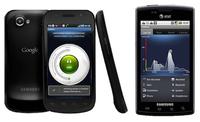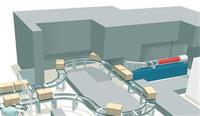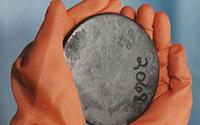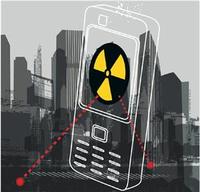-
Novel radiation detection technology to thwart nuclear terrorism
Researchers at the Georgia Tech Research Institute (GTRI) are developing ways to enhance the radiation-detection devices used at ports, border crossings, airports, and elsewhere; the aim is to create technologies that will increase the effectiveness and reliability of detectors in the field, while also reducing cost
-
-
Android app for radioactivity detection

Just-release Android app uses software and the smartphone’s camera to measure radioactivity levels, allowing users to find out whether their environments are safe; the software is the civilian version of technology developed under contracts with the U.S. Department of Defense and with DHS
-
-
U.S. nuclear industry strong safety performance in 2011
Studies show that the U.S. nuclear power industry achieved strong safety performance in 2011; U.S. nuclear energy facilities in 2011 recorded the lowest number of unplanned shutdowns in more than a decade
-
-
E-beam technology to keep food supply safe

More than two million people a year, most of them children, die from food-borne or water-borne illness; more than one-third, or 1.3 billion tons, of the food produced for human consumption every year is wasted or lost because of spoilage; the UN nuclear weapons watch dog, the IAEA, says that irradiating food is a more effective solution for preventing death, illness, and food spoilage than techniques currently in use: heating, refrigerating, freezing, or chemical treatment
-
-
International collaborative effort to develop better radiation detection tool
In mid-February, the Flash Portal Project was launched with the aim of furthering the development and testing of a new technology to detect shielded nuclear materials
-
-
A nuke blast in D.C. would not destroy city: report
A study finds that a 10-kiloton bomb detonated in Washington, D.C. would destroy many buildings and kill many people, but it would not completely destroy the city; says one expert: “If you are thinking about (a city) being wiped off the face of the earth, that’s not what happens”
-
-
Nuclear summit focuses on terrorist nukes

The Seoul nuclear summit focused on the risk of nuclear terrorism; there are two risks: first, fissile materials, which terrorists may use to construct a dirty bomb, is kept at thousands of medical, research, and industrial facilities around the world – often without sufficient security; second, constructing a Hiroshima-type bomb is not as difficult as we may think
-
-
U.S., three European countries, commit to HEU reductions

Leaders of Belgium, France, the Netherlands, and the United States said they were taking steps to minimize the use of Highly Enriched Uranium (HEU) for civilian purposes, where technically and economically feasible, in order to advance the goal of nuclear security
-
-
MRIGlobal awarded $9 million to evaluate detection gear
Kansas City company in a $9 million contract with the U.S. Army to test and evaluate equipment to identify chemical, biological, and radiological hazards in the field
-
-
Breakthrough in next gen nuclear detectors

Researchers have long struggled to develop radiation detectors that can spot a nuclear device hidden away in a shielded case, but a recent breakthrough could change all that
-
-
Scientists develop a dirty bomb detection system
As part of a £3 million international project funded by the European Commission, scientists at the University of Liverpool are developing a mobile detection system for nuclear materials that could prevent the construction of atomic weapons and dirty bombs
-
-
Monitoring nukes with social media

Acting Undersecretary of State for Arms Control Rose Gottemoeller is actively trying to find a way to incorporate social media tools to prevent nuclear weapons proliferation and keep fissile materials out of the hands of terrorists; the department wants to have crowdsourcing tools developed that could help ordinary citizens monitor a government’s nuclear activity and whether it was adhering to its stated promises
-
-
U.K. worried about dirty bombs

U.K. deputy prime minister Nick Clegg warned that materials to make a dirty bomb are readily available – so much so, that police forces cannot hope to contain such a threat; “That is a stateless threat, impossible for any national police force, no matter how advanced, to contain,” he said
-
-
Better policies needed to reduce radiation exposure in nuclear accidents
A new study says that offsite policies and plans should be put in place to reduce the exposure of the public to radiation in the event of a nuclear power plant accident
-
-
New radiation sensor developed
Scientists have created one of the most advanced radiation sensors in the world: an X-ray detector that can reveal the composition of materials in a fraction of a second
-
- All
- Regional
- Water
- Biometrics
- Borders/Immig
- Business
- Cybersecurity
- Detection
- Disasters
- Government
- Infrastructure
- International
- Public health
- Public Safety
- Communication interoperabillity
- Emergency services
- Emergency medical services
- Fire
- First response
- IEDs
- Law Enforcement
- Law Enforcement Technology
- Military technology
- Nonlethal weapons
- Nuclear weapons
- Personal protection equipment
- Police
- Notification /alert systems
- Situational awareness
- Weapons systems
- Sci-Tech
- Sector Reports
- Surveillance
- Transportation
Advertising & Marketing: advertise@newswirepubs.com
Editorial: editor@newswirepubs.com
General: info@newswirepubs.com
2010-2011 © News Wire Publications, LLC News Wire Publications, LLC
220 Old Country Road | Suite 200 | Mineola | New York | 11501
Permissions and Policies
Editorial: editor@newswirepubs.com
General: info@newswirepubs.com
2010-2011 © News Wire Publications, LLC News Wire Publications, LLC
220 Old Country Road | Suite 200 | Mineola | New York | 11501
Permissions and Policies
